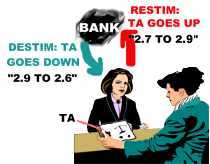Home Search Level 0 Level 1 Level 2 Level 3 Level 4 Level 4Pro Level 5 C/Sing Solo
| Tech terms | Scales | Axioms | Drills | Checksheets | Processes | Prep. lists | C/S terms | C/S tool | Grades | Cramm | Points | KTW | Online |
|
Home Search Level 0 Level 1 Level 2 Level 3 Level 4 Level 4Pro Level 5 C/Sing Solo |
|
|
| Tech terms | Scales | Axioms | Drills | Checksheets | Processes | Prep. lists | C/S terms | C/S tool | Grades | Cramm | Points | KTW | Online | |
Confessional Techniques
Confessionals are an important part of auditing. Auditing is designed to bring up the pc's level of awareness and responsibility.
Along with these factors coming up, the pc's recognition of overts is becoming greater.
Confessionals have their place and should be done from time to time to secure the pc's progress. It is a cleaning activity. It helps speed up and advance cases. It is traditionally a causative way to get pc's rudiments in thoroughly so they stay in for a long time.
As we have seen, O/Ws are behind ARC breaks, missed withholds and problems. The clean up of overts thus works as to prevent future ARC breaks, missed withholds and problems.
Auditors Beingness
The auditor needs to learn to do this action well. It is
demanding on his ability to observe the pc, and avoid Q and A. He has to be able
to do it without an accusative attitude - and also without adopting a too
understanding attitude. It can at times require courage and persistence above
and beyond what he has to show in normal, repetitive auditing. He simply has to
be willing to take the pc in session and be willing to dig in and find overts
and withholds and pull them in a way so the pc can take responsibility for them.
To do that he should use a workmanlike approach; he is digging in energetically,
simply to find what he finds. Nothing can surprise him in terms of human
behavior. He is not a moral judge or there to console the pc, but simply there
to help the pc overpower his Bank and its resistance to make him look; he
has to create a safe
atmosphere where the pc can 'reveal his secrets'.
 |
The auditor should use a workmanlike approach; she is digging in energetically, simply to find what she finds. |
The auditor's focus should be to get the pc to look in his Bank so he can tell the auditor. It shouldn't be to 'get it out of the pc' - as that would mean a reluctant pc not really in-session. A pc in-session has no trouble telling the withholds. He may have trouble finding them and recall the details asked for as there is a lot of Not-is and denial on top of it.
In terms of metering the success of the auditor is measured by the degree he is capable to get reads on the Meter and his follow-up in getting it all and thus clean up the reads utterly and completely. As a final test the original question has to F/N when rechecked.
Get the 'Done'
The auditor is looking for pc action, pc's actual
doingness in the incidents. He can ask for this in great detail as to get the pc to relive what
he actually did. He gets whatever is there in an up-tone and positive
atmosphere. He gets it out in the open so the pc can actually take a
new look at it, without feeling cornered or accused. The whole purpose is, to
separate these actions out from the pc's Bank so he can take responsibility for
them and As-is them. By getting the Done, the pc is actually put at Cause and
will have better gains than you would ever suspect. The auditor is not satisfied
with generalities. He needs time, place, form and event (Axiom 38).
Get the Justifications
Getting off
the pc's justifications when pulling overts and withholds is a proven
technique. It is important that on each overt pulled, the pc's
justifications for that overt are gotten.
The pc will often have justifications for his acts. This is a non-confront of his own causation. By justifying he is lessening the severity of the overt. As long as he has an overt justified, he hasn't taken responsibility for it and it will still be charged. Thus, getting the pc's justifications helps raise his cause level and responsibility.
The pc's justifications can be gotten by asking, "Have you justified that overt?" or "Why wasn't that an overt?" This is asked until the auditor has gotten them all. They will often come off in a torrent, giving the pc great relief.
Example: Auditor is running, "Have you ever stolen an apple?" After getting time, place form event he goes on:
Auditor: "Why wasn't that an overt?"
Pc: "Because I was hungry. You don't let anyone starve. "
Auditor: "Thank you. Other reasons that wasn't an overt?"
Pc: "Well, the store had so many apples in the basket; it wouldn't hurt them to lose a few. They calculate with a 5% loss - and after all, they've overcharged me before, so they owed me one. I always shop there so they're still making plenty of money on me."
Auditor: " Okay. Why wasn't that an overt?"
Pc: "That is all. Wow! I really had that one justified."
Auditor: "Thanks very much. The auditor goes on to the next step for handling that overt.
Other People's Withholds
Sometimes you will find pc's giving 'other people's
withholds'.
Examples: Pc gives "I have the W/H that my friend has been in jail", or "I have the withhold, that Pete said you were no good". Getting off other people's withholds is not going to do the pc any good and is usually a little red flag. A withhold by definition is something the pc did that was an overt act, which he is withholding and thus keeping secret. Getting those off is what move cases. The 'other people's W/H's' is just a symptom of him having similar O/Ws of his own; that is also the handling:
You ask pc, "Do you have a similar withhold of your own?" and find the done and pull that Chain.
"Murder Routine"
The so-called Murder Routine is a 'Worse than' technique.
The auditor gets the pc to give up his overts by asking him 'terrible' questions
and suggesting real bad overts.
Example: Auditor: "Have you committed an overt on your wife?" F. Pc silent and apparently embarrassed. Auditor: "Did you murder your wife?" Pc: "Oh no! I cheated on her though", F.
As in the example it is used to get the pc started, when he sits on something he has in plain view. You may say the Confessional lists themselves have this principle built into them as they usually include a list of questions about serious crimes and then a list of more likely overts for the average pc.
Model Session
Confessionals are done in model session. The auditor starts the session as any
other auditing and fly the rudiments as needed.
He gives the pc the R-factor, that he is going to help him clean up the questions asked. He should show the pc Auditors Code #22, "Never use the secrets of a preclear divulged in session for punishment or personal gain" and reassure the pc of the protection of the auditor-pc confidentiality. By his attitude he should reassure the pc, that he is there to help him find and As-is the overts and withholds uncovered. Much of what the auditor is up against is, that the pc has been trying to Not-is these overts and withholds, so there is a lot of suppression, denial, unknownness and outright stupidity that has to come off in the process (Axiom 18).
The auditor is not there as a mere Meter operator, who simply is satisfied when the needle doesn't react. Instead he has to take pride in a good TR-1, that really impinges on the pc and his Bank and gets reads. He is there to get his questions answered fully and in detail - not simply to clean the needle. The auditor could possibly keep the needle clean by bad TR-1, failure to dig in and not by getting the pc in-session. His objective is to get it all by persisting vigorously on getting all the details and use good TR-1, high ARC and exact metering to assist him in that.
As explained under Grade 2 (process 4 and 9) there is such a thing as a "dangerous auditor - the auditor who is afraid to find out, afraid to be startled, afraid to discover something, afraid of what they will discover. This fear prevents such an auditor from flattening anything. This results in missed withholds. And only missed withholds create ARC breaks.
To overcome that, the auditor should be well drilled and he himself should have completed Grade 2 and one or more Confessional Lists.
Grooving in the Question
Let's say we use the question "Have you ever eaten
an apple?" in the examples below. Questions like this are often used in
drilling as it is non-restimulative.
When you take up a new question from the Confessional Form your first action is clearing the command and groove in the question. Fist you clear the question per 'Clearing Commands'. Then you ask pc what the question means. In addition to this standard question you ask him of examples of eating apples, what time periods he would have contact with the general area of apples; what other people would likely be involved and similar questions. The reason for 'grooving in the question' is to steer the pc's attention onto the Bank and make any possible answers come alive. During all this you keep an eye on the Meter for any valid read. If you get a valid read (per Clearing Commands) you take up the question. If no read, you check it on the Meter now.
When you take up a reading question the pc may give you an illogical answer. You go easy on TR-3 here and dig around to find the real overt. Confessional is not done repetitive style. The style is called secondary guiding style. You ask questions to find the real difficulty (the 'Done') and then you do two way comm on the area (per confessional procedure's "When, Where, All, Who"). If the pc gives you a general answer you ask for a specific time to nail it down to one actual incident. Pc: "It happened all the time". "Can you give me a specific incident?"; you nail it down and get what the pc did, that was an overt. If the pc gives you a motivator you will have to get busy and find the overt: "OK, but what did you do?" You look a little earlier than the motivator as that is the likely time. "I got mad at him because he insulted me". That's a motivator. You ask, "What had you done before he insulted you?" and the pc confesses, "I used his car without asking".
You do not accept critical thoughts, unkind thoughts as overts, nor do you want explanations or his later thoughts about it. You want what the pc has done, Time, Place, Form, Event. The actual incident from a causative viewpoint of 'Done'.
When you have pulled the first overt, you don't stop
there (unless you got a full EP). You ask for an earlier time he had done
something like that, pull that overt in the same way. When you get to the
earliest one and pull that, the whole Chain of incidents will fall apart and
blow off like smoke from a put out fire.
Varying the Confessional Question
As described above, Confessionals are not done Repetitive
Style. This does not mean that TRs are not applied. Even TR-3 applies very
much, but
sometimes with a twist. The basic concept of TR-3 is to get your question
answered - this applies very much to confessionals.
When you talk about pulling withholds the real danger is missing withholds. Sometimes you will have to switch to what could be characterized as a 'TR-4 detour' to get it all when available. The 'Vary the Question' is one way of doing it. It applies when the pc has a reading question, but insists there is nothing there.
The normal routine if you run into any kind of troubles, is to first check the Trouble Buttons: (1) Check for missed withholds, (2) Check for False Read, (3) check for ARC break. (After that you can even do a Confessionals Repair list). But as said, Confessional is not a canned procedure. If you know what you are looking at you can choose to vary the question. It applies when the pc is unwilling to give an answer; he apparently says to himself that what came to mind is not an answer to the question.
Example: "Have ever eaten an apple?" (Fall). Pc: "No" You check the 'Trouble Buttons', but it doesn't resolve. Now you can vary the question, "Have you ever eaten any fruit?" F (a duplicate read). You look expectantly at the pc and repeat optimistically "Have you ever eaten any fruit?" Pc: "Oh, you mean bananas?" Auditor, "Sure, have you ever done that?" Pc, "Oh, yes". Now the pc gives a withhold and you take it all the way to F/N.
F/N All
You recheck, "Have you ever eaten any
fruit?" and it now F/N's. Now you recheck your original question "Have you
ever eaten an apple?" and it reads. You find the O/W and pull it to F/N.
Then you recheck "Have you ever eaten an apple?" Now it F/N's.
You have taken pc's 'round about origination' (eating
bananas) and handled it and you maintained communication throughout. Also you
avoided creating a missed withhold. So getting your original question answered is simply a longer cycle, but just as important
as in any other auditing. Not to take each question to F/N is called Q and A.
It's a failure to complete a cycle of action on the pc. This is a unthinkable sin in
Standard Clearing Technology.
Additional Questions
The above type of thinking of 'Varying the Question' can
also come into play in suggesting next C/S. You have one question that makes the
pc feel uneasy and apparently it is a little bit off. Low responsibility pc's
sometimes need a direct hitting question before they fully own up. If that is
the case you can suggest a number of questions in that particular area like,
"Have you ever eaten a pear?" (and a list of other suspected fruits,
etc.) and possibly, "Have you ever destroyed an apple?", etc., wherever
your good common sense and perception tells you there is something to get. This cleans
up the whole area and you go back to doing your standard Confessional Form.
When doing a confessional form you never delete questions. This rule is simply in place as not to open the door to 'let the pc off easy'; or a situation where the auditor can feel uneasy about questions himself and thus want to take them off the list. You simply check all the questions on the Form; if they are clean, you just F/N the fact and go on to the next one. You would usually add a few questions, tailor made to fit the pc's job and activities.
Tailor Made Confessionals
One type action which can produce tremendous TA action and
potential gains is a tailor made confessional. So the question is, what should
you cover? You can in principle cover any group the pc
has ever been a member of. If he has problems with one particular group you
should cover that. The thing to know is the moral code and mores of the
group; you formulate the questions based on that. One thing that would help the
pc on an immediate basis would of course be a confessional covering his current
main group. This would clean up his relationship and rudiments in the area. You don't want to stop there necessarily. Auditing pc on the
present group will put the rudiments in, now you want to go for permanent gains.
So you explore his past a bit to find groups, he has been a member of.
The groups that will produce the most TA action are groups, where the pc was a very active participant. A group with a tight moral code or rules, like the military, pc's church, a boarding school or maybe his upbringing. In deciding what to audit, you would use the data in 'The Prior Confusion' of Level One. It should ideally be an area with a lot of motion followed by later inactivity in life or a complete change of career. Because what you want to find and handle with confessional tech is a prior confusion. The four areas mentioned above have very different mores and you always have to audit against the mores in confessional tech. The military, the church and pc's strict parents and the boarding school may in turn have imposed entirely different rules and mores on the pc. If you in this example audit one set of mores after the other you would straighten out the pc in an absolute life changing manner. It would be 4 different auditing actions, each done to EP. Since you are looking for 'Dones', areas with physical activity are good candidates for tailor made confessionals. Joe, from our example in 'What is a Withhold' should be audited on Holy Crusaders, Save the Innocent Children Society, and the Customs Department and you would see the sparks fly.
 |
 |
 |
|
If Joe was your pc, you would figure out the
specific mores for each of the 3 groups and |
||
Mutual Out Ruds
If two or more people have the same colored opinions or bad attitude about
something you have a situation of 'Mutual out ruds'. They agree on 'something
being bad', or 'It's OK to do that kind of things' when in fact it may not be.
Example: A husband and wife is auditing each other (co-audit). They never run O/Ws on certain family members; they both have the same type of overts against these people and thus consider it 'normal'.
Example: Two course students co-audit. They both have similar 'out-rud' situation with other class mates and instructors, so they never think of cleaning it up.
At one time a small group doing co-auditing on each other, decided 'it wasn't needed' to write down the O/Ws in the auditing reports as they were afraid of loosing reputation. It led to missed withholds in relationship to the C/S and other group members and they eventually blew.
Especially co-audit C/Ses should be aware of possible Mutual Out Ruds. The
co-audit team can have mutual out ruds to the group, in their relationship to society,
to government or other
groups. It is handled by flying the rudiments on the surrounding people, groups,
society, etc. This is best done by someone who is not part of this mutual out-rudiment
situation, of course.
 |
Q & A: Incomplete |
Incomplete Cycles (Q & A)
Since Confessional auditing isn't a repetitive process or
procedure a beginning auditor has to be extra careful to keep track of and
complete all auditing cycles begun (see Auditors Code #9,
12, 18).
A high percentage of auditing failures stem from incomplete cycles. A cycle of action is here defined as: Start-Continue-Complete.
An auditing comm cycle is a cycle of action. It begins with asking the pc a question he can understand (start); the pc answers (continue) and the auditor acks the answer (complete).
A process cycle is, finding a process which is charged, to run on a pc; run it long enough to 'bite' and get it to produce Tone Arm action; continue the process until all the available charge is gotten off by running out the Tone Arm action; complete the process by recognizing the EP when it occurs and end it there (see Auditors Code #13, 16).
An Auditing Program cycle is to select an auditing action for the pc (usually done by C/S), carry through with the program and completing it to the desired result.
An auditor who interrupts, changes or forgets to keep
track of and complete an auditing comm cycle leaves incomplete cycles behind. R.
Hubbard called this Q & A (see also 'Auditing
and Comm').
This can happen in a number of ways. If you ask a question and get an answer
that is off the question, then take pc's off subject answer as the new direction
and forget to get an answer to the original question. An auditor can start
a process; the pc gets a cognition. The auditor gets a 'bright idea' based on
that and 'forgets' to complete the original process. This is 'Q & A'.
Unfinished cycles messes up cases. The original charged question is never
discharged. In confessional auditing this adds up to missed withholds. When you
abandon a started cycle of action the pc tends to hang up in time right there.
"Don't Q & A" means, "Don't leave cycles of action incomplete on a pc." In confessionals it means, "Don't open the door for missed withholds as it leads to upset pc's and failed sessions".
Meter Steering
Meter Steering is taught in Meter
Drill 21-A. It is very useful
in doing Confessionals. It means to call a duplicate read to the pc.
Example: "Have you ever eaten an apple?" Fall. Pc is hesitant and maybe looking uneasy. You see a duplicate Fall on the needle. Each time it occurs you say "there", "there", etc. and now the pc knows exactly what you mean. He will often crack up and laugh a little and give you the withhold and off you go getting all the details, E/S to EP.
The Meter and Auditors Code
The auditor is bound by the Auditors Code. The Meter is
not. If the Meter reacts, the auditor must take that question and find the overt
and pull it and get an EP on the question.
A Confessional question must never be left without an F/N. You do not leave a question until the Meter, the pc and the auditor seem all in agreement on, that the area or question is cleaned up completely.
It is not uncommon that the auditor has to set the Meter's sensitivity higher than a standard can squeeze calls for in order to get it all. If the can squeeze had the sensitivity at 5 it does not mean the auditor can't boost it to 16 or 32 when he is in a hot pursuit of getting the pc to come clean. The senior datum here is not to miss withholds or leave withholds behind, that will be missed later.
Another thing the auditor uses, when things don't seem to
read when it was expected or supposed to, are the so-called Left-hand Buttons.
The most used are of course Suppress and Invalidate. There are several more.
Here is the list: Suppressed, Invalidated, Careful of, Nearly found out, Failed
to reveal, Anxious about.
These Left-hand buttons can all be used to get a question to read or F/N.
'Protested' can be used with caution. It does not necessarily turn up a valid
read but can be used to clear the way.
Cleaning Cleans
A phenomenon that very well can come into play is
'Cleaning Cleans'. It means to insist upon there is more, when there actually
isn't. When doing a thorough Confessional you are always close to that line. A
pc that really has more to tell doesn't ARC break, but will eventually give in
and tell it all. A pc who is continuously pushed beyond the point, where he has
told all will however feel accused and upset. You have to walk a fine line
between not leaving missed withholds and pushing the pc beyond the limit. So you
have to be perceptive to this. If you suspect you are Cleaning a Clean, you can
ask, "Have you told all?" If that is the case you will see the pc
brighten up and relax. On the Meter you should see a nice Fall if that is the
case.
You may have to check "Has a withhold been missed?" or "Have I not found out about something?" as well to make sure to cover both sides of the border line. If that latter is the case you would see the pc react with a sly flinch. The Meter should give a read.
Part of this whole problem can be pc protest against a question, which can result in a protest read. If you ask, "Have you ever poisoned an apple?" it could be offensive to pc. The resulting read was on his protest and "No!" to the question, whether expressed or not. Pushing the pc on a protest read would be visible on the pc, as he becomes desperate about why the auditor won't accept his answers. If this is the case the question, "Is this question being protested?" should give a fall and be taken up as an out rud per 'Auditors Rights" and 'Flying Rudiments'.
There is no excuse for ARC breaking pc's or leaving
missed withholds in place for future ARC breaks to occur. That is why it takes
good perception and good sense on the part of the auditor in order to do
Confessionals well.
Middle and End Rudiments
Confessionals are no different from other auditing in
observing the pc's rudiments are in. You fly the rudiments in the beginning of
session so you can start the Major Action with F/N VGI's. When you are well into
the action you can at different times check variations of missed withhold
questions. This is called the Middle Rudiments or Mid Ruds for short. You will
often find missed withhold questions at the end of a printed Confessional form.
You would check if you find the pc's indicators are going out a bit, way before
any troubles develop. You can use one or several of the following:
In this session have you:
Told any Half Truth?
Told any Untruths?
Has a withhold been missed?
Have you Told All?
Have you said anything just to impress me?
Is there anything I have failed to find out about you?
Told anything beyond what occurred?
Told part of a withhold, but not the rest?
You can pick a question or questions you suspect may be charged and check them. You would only do such a check as Mid Ruds to a point where the pc is again VGI's.
When ending a confessional session, you would check the first four of the above questions as a standard action. It is called the End Rudiments.
When ending a Confessional List entirely, you will usually find the first four questions at the end of the printed form. You check them with the prefix: "In this confessional has....?" to cover the whole action.
Types of Cases
There are different types of cases related to O/Ws
that
the auditor should have a knowledge about.
Fist of all, what can be seen to lie behind overts and withholds in the majority of cases is an inability in Man to predict or realize the consequences of his actions. More often than not an individual operates in such a short time frame so you could say he is stuck in present time. He is tangled up in confusions so he rarely sees the consequences of his actions or failures to act. A person living 'from paycheck to paycheck' is just trying to get by and in doing so he can do all kinds of stupid things which he later regrets or gets blamed for. Pressure from his friends to do certain things, economical pressures, time pressure, group pressure and even government pressure forces him time and again to act in a shortsighted way. There is a definition of Overt that ties in with that: "A harmful act done in an attempt to solve a problem".
You will find criminal types completely unable to predict to a point where they have no concern or fear of consequences. Overts and withholds has become a way of life.
A withhold can be measured on a scale by the amount of danger the pc believes to be present in getting off the withhold. If the withhold is not dangerous, he will just give it. If it is somewhat dangerous, he will explain around it. If it is rather dangerous, he will criticize. If it is super dangerous, he will give you a motivator. We are taking about dangerousness in the eyes of the pc. This gives you an index to the case. A case is as bad off as he considers it dangerous to reveal himself.
Man is basically good
The fact is, that Man is basically
good. When his awareness goes up he begins to be able to predict and see the
consequences of his evil actions to self and others. He is also more his natural
self.
The more he is freed and the higher his intelligence and ability gets the more ethical he becomes.
Only when he is beaten down below awareness as a chronic condition does he commit evil actions and overts as a quick fix and a way of life.
 |
Her confession is |
No Overts Case
Occasionally there are a case "who has never done anything
wrong or committed any overts".
Such cases should not be put on Confessional auditing as it would overwhelm them by feeling totally accused falsely.
As such they would fall outside this chapter, as it takes other auditing to get their responsibility level up. But just a few remarks on the approach.
You would use light approach and discuss what a harmful act would be. You would also have to realize, they hadn't made it up to Grade 2 and you would have to check earlier auditing for being out. Of what is available to a Class 2 auditor, False Data Stripping, ARC processes (as on Recall) can be of value. (There is a Rundown, "Way to Happiness" Auditing, which would apply to such a case, included in ST4). Also Help and Failed Help may need to be flattened. One handling a ST Class 2 auditor can do is the following:
1. Fly a Rud to F/N VGIs
2. Assess: Help, Failed Help, Refused Help, Prevented Help.
3. Run Recall processes four flows on reading items, each to EP.
Continuous Overt Case
This type of person does Overts on a regular basis and present a type of case
you would leave alone or turn over to professional auditing and handling. In
many cases you should turn such a case away entirely.
You will find such a case having 'no case gain' due to
continuous overts between sessions. He needs as a first step, to have his
'Ethics put in', meaning enough discipline administered to him to straighten out
his life and to prevent him
from doing overts while being handled or audited. His continuous overts can be
seen to be solutions to a continuous present time problem in life and he can be counseled
on the basis of that. He may possibly benefit from study and especially from
word clearing as 'The Cycle of an Overt' suggests misunderstoods as being behind
overts. A full handling of a 'Continuous overt case' - if he will fully cooperate, as that is required - would include
Fixated Purpose RD, which is an
advanced form of Confessional procedure where evil intentions prompting overts,
can be found and handled (Fixated Purpose RD is part of ST4. To be able to do
that the auditor first has to be an accomplished Confessional auditor).
Confessional Procedure
There are a lot of hard data in this chapter. It has to
be combined with the chapter 'Confessional Procedure'. You need to drill
Confessional Procedure and use both chapters as reference for getting it all
together and clicking and working.
Confessionals are a fruitful source of cognitions, because you are pulling off the Preclear's not-knows on the group or subject addressed. This have kept others in ignorance and himself in stupidity. You also increase the Preclear's ability to communicate as he gets more and more withholds off. On top of all this you make a pc easier to audit as his source of repeated out ruds is being handled.
Pretty good gains to work for. Well then, let's get busy!
|
Home Search Level 0 Level 1 Level 2 Level 3 Level 4 Level 4Pro Level 5 C/Sing Solo |
|
|
| Tech terms | Scales | Axioms | Drills | Checksheets | Processes | Prep. lists | C/S terms | C/S tool | Grades | Cramm | Points | KTW | Online | |